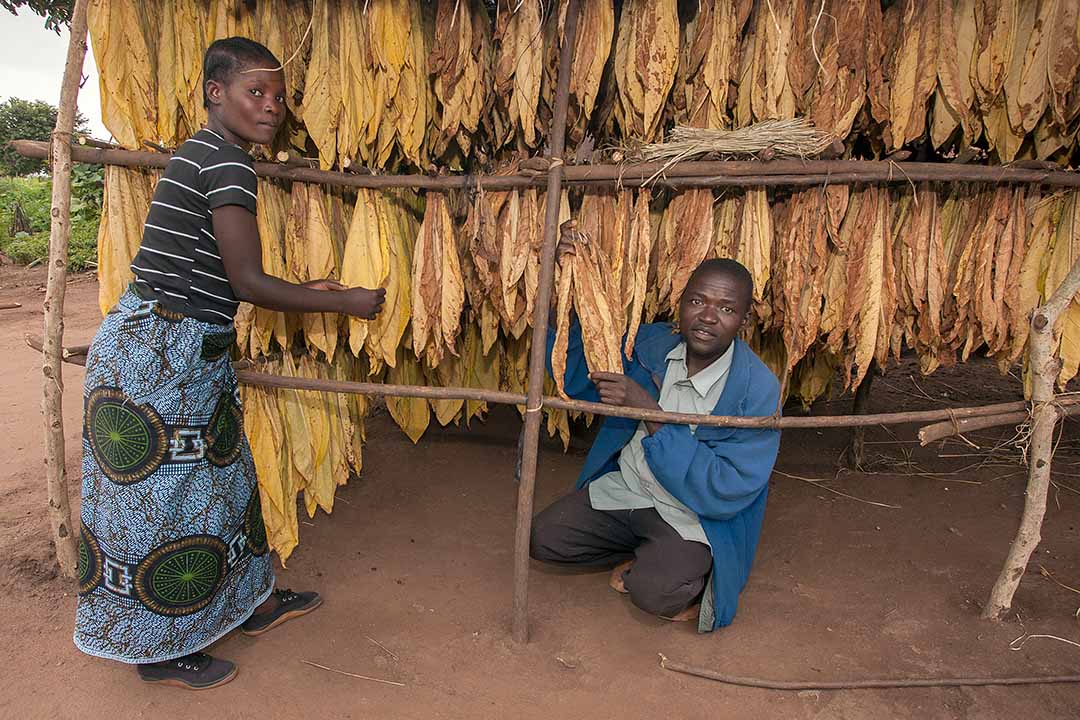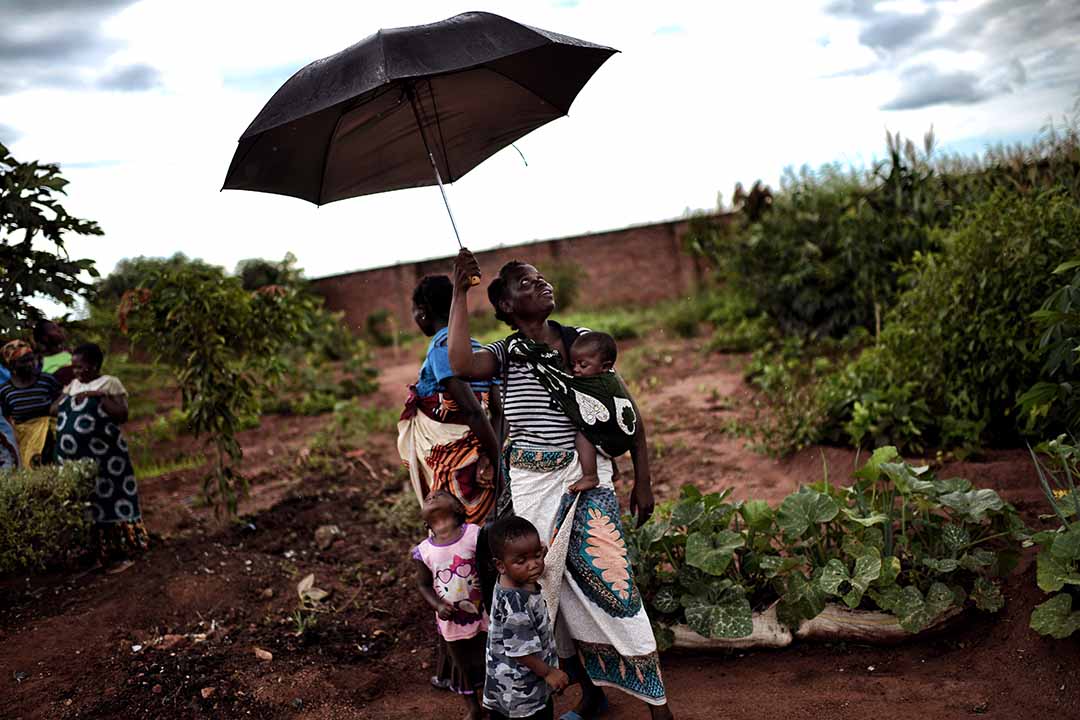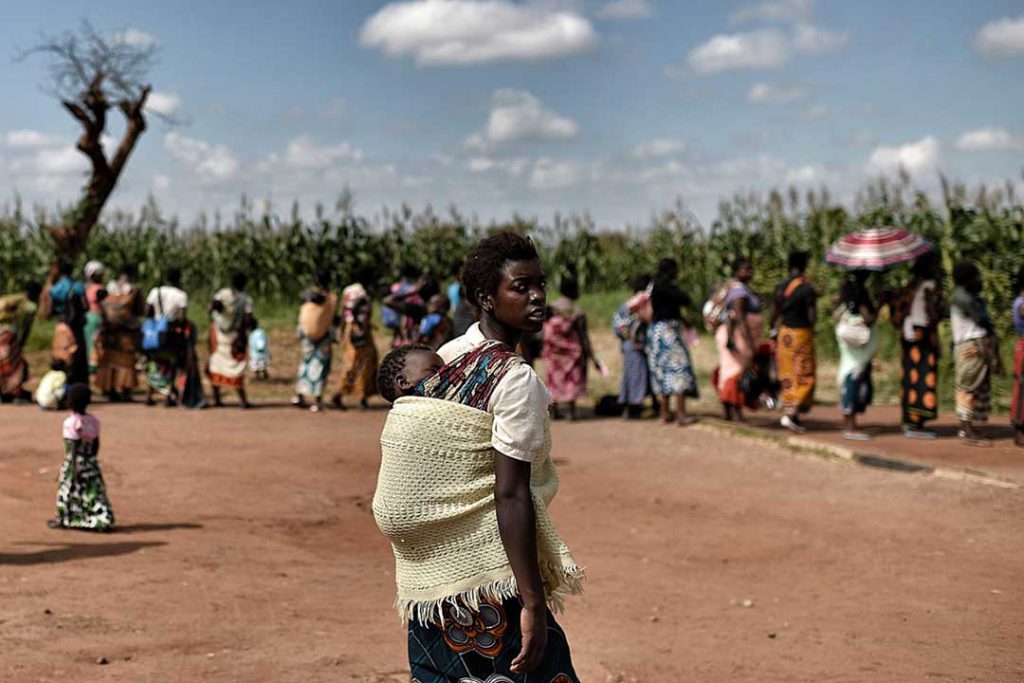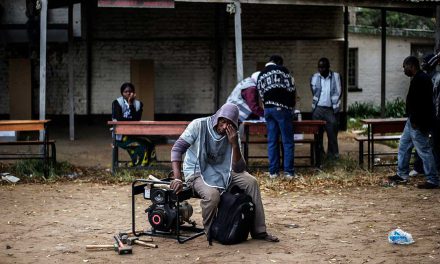Malawi: unintended consequences
Lengthy school closures to control the spread of the coronavirus have led to a surge in already appalling numbers of teen pregnancies and early marriages

Catherine Julio Funsani, 19, and her 21-year-old husband Maliko Funsani tend to their tobacco on March 7, 2015 in the barn of their home in the village of Fule, Group Village Headman Kamphampha in the area of Chief Mponela in Dowa District, central Malawi, some 70 kms north of the capital Lilongwe. Catherine got married to Maliko in 2011 when she was 15 and he was 18. Malawi is poised to adopt a law banning child marriages in a country which has one of the world’s highest rates of under-age weddings. AFP PHOTO / AMOS GUMULIRA (Photo by AMOS GUMULIRA / AFP)
It’s a cold Monday morning and a normal working day for people employed in the central business district of Blantyre, Malawi’s commercial capital, and not only for staff of essential service institutions such as hospitals and the police. Businesses such as grocery stores and market places are also open, as are regulated and unregulated alcohol sales outlets and video showing rooms, where people go to watch movies. Many of these video showing rooms also sell alcohol, and they have become a haven for young people who have been on an indefinite “holiday” since 20 March this year, when the government closed schools as part of its efforts to combat the coronavirus pandemic (COVID-19). They are also popular with youth in other high-density areas of Malawi.
The government closed schools even before the first COVID-19 case was reported in the country. Since then, schools have remained closed, which has created another looming health problem. In addition to COVID-19, health experts and community activists say the indefinite school closures have led to a second pandemic; a surge in teenage pregnancies and child marriages. Malawi, one of the most impoverished countries in sub-Saharan Africa, already struggles with high rates of child/early marriage and teen pregnancy, but cases have soared since March. So, as the world struggles to bring COVID-19 under control, Malawi is stuck in the middle of two pandemics. As of 17 August 2020, Malawi had registered a total of 5,125 COVID-19 cases and 162 deaths, but the surge in teenage pregnancies and child marriages during the pandemic is as much a cause for concern.
Malawi’s Ministry of Education, Science and Technology says since the closure of schools in March, Malawi has registered 18,000 teen pregnancies among primary school learners and 3,931 among secondary school learners in all of Malawi’s 28 districts. Harvey Chimatiro, executive director of Concerned Youth Organisation, an NGO for young people operating in Blantyre, describes these fi gures as shocking. It is unfortunate, he says, that with the attention given to COVID-19, other important health issues such as youth sexual reproductive health are being neglected. “It’s heartbreaking to note that some parents are even coaxing their girl children to engage in sexual activities or marrying them off in order to alleviate household poverty,” he told Africa in Fact. “There is a need for parents to play an active role, now that young people are not going to school and are probably idle at home. In addition, there should be deliberate messaging of sexual reproductive health issues targeting youths during this time.”
Patson Symon, chairperson of the Machinjiri Chilaweni Youth network, located in the traditional authority of Machinjiri in Blantyre, confirmed that girls in his area had entered into early marriages to alleviate family poverty. Symon himself is one of the youths who have benefited from sexual reproductive health programmes conducted by NGOs in the area. Between March and June, in his capacity as a trained youth leader, Symon referred 13 young people with gonorrhoea to the nearest health facility for treatment. “This is a sign that youths are having unprotected sex. They came seeking counselling and support. That’s when I advised them to seek medical help,” he says. During the same period, Symon told Africa in Fact that 26 early marriages were recorded within his youth network catchment area. Twenty of these were abolished, in collaboration with community-based organisations, traditional leaders and other NGOs.

A woman and her children stand under an umbrella in Lilongwe on March 14, 2016. (Photo by ARIS MESSINIS / AFP) / RESTRICTED TO EDITORIAL USE
Six couples were not immediately separated, because the girls in the marriages were already pregnant. “A lot of girls from my area are into casual relationships with ‘sugar daddies’ in exchange for money and they are getting infected with sexually transmitted infections (STIs) in the process,” says Makata area Youth Network chairperson Esther Mambo. “Idle boys are into alcohol and substance abuse and risking their lives engaging in unprotected sex.” Senior Chief Kachindamoto of Dedza, a champion against child marriage in Malawi, says the surge in early marriages and teenage pregnancy during the pandemic is very worrisome, but she believes traditional leaders have a big role to play in finding solutions to the problem. She recommends that traditional leaders work together with NGOs, the social welfare department, Mother Groups (grassroots groups of women whose role it is to assist in rescuing girls from child marriages and keeping them in school), religious leaders and parliamentarians.
“In my area, I have mobilised group village headmen, parents, teachers and NGOs to ensure there is no laxity in the strict child marriage measures (instituted in her area). It has been emphasised that school closures are not a licence to immorality,” she says. Kachindamoto has personally put an end to 5,449 child marriages since she was elevated to chief in February 2004. In the process, she also demonstrated her authority when she suspended 36 chiefs for aiding and accepting child marriages in their respective areas under her jurisdiction. Civil Society for Quality and Basic Education Executive Director Benedicto Kondowe believes that Malawi’s struggle with teenage pregnancy and child marriage has intensified during the COVID-19 pandemic because of the country’s poor approach to sexual reproductive health issues.
“We need to abandon unrealistic moral and cultural issues and adopt policies that will make a difference. For instance, how is the policy of providing sexual and reproductive health services such as condoms 100 metres away from schools, for fear that their availability will lead to promiscuous behaviour among learners, helping us? Now look at what is happening,” he says. (Malawi’s Ministry of Health is not permitted to distribute condoms or other contraceptive services on school premises because the Ministry of Education promotes abstinence, but may provide them at least 100 m away from schools.) Kondowe says the high number of teenage pregnancies, despite several NGOs working with youth in the area, is a clear indication of the need to revise the strategies in place to ensure that young girls are not as vulnerable as they are.
“This issue calls for a very serious reflection on how we go about delivering our services and projects to these areas,” he says, “but we do need a joint effort to deal with this problem.” Meanwhile, the national coordinator for adolescents and the youth sexual reproductive health programme in the Ministry of Health, Hans Katengeza, told Africa in Fact that there had been a decline in the number of young people accessing sexual reproductive health services during the pandemic, despite massive awareness of the availability of the services. A Ministry of Health policy brief document titled ‘COVID-19 on Youth Friendly Health Services (YFHS)’, published in July, said the number of young people using these services had declined from a monthly average of 717,622 to just 481,210 across the country.

The document also indicated that some of the most popular services − family planning information and services, condom promotion and provision, and HIV testing and counselling services − declined by 35%, 18% and 40%, respectively, between the months of April and May 2020 as compared to the same period in 2019. “We don’t know if it’s because of confinement, but I believe this is an issue that could also be attributed to other factors, which may also include gender-based violence,” Katengeza noted. He suggested that a multi-sectoral approach was required, with government and CSOs, youth-led organisations and other partners playing their role in order to deal with this issue holistically. Minister of Gender, Children, Community Development and Social Welfare Patricia Kaliyati says she is meeting traditional leaders across Malawi, directing them to dissolve all child marriages in their jurisdictions.
“The girls in those unions should return to school once the schools reopen,” she told Africa in Fact . “Those that are already pregnant should also go back to school after the delivery of their babies. They (traditional leaders) have their own by-laws, which they need to enforce in delivering this directive,” Kaliyati points out, adding that she will be following up on this matter to ensure that it is implemented. In an interview with Africa in Fact, Secretary for Education Chikondano Mussa said: “It’s surprising that this is happening when the children are under the best care of parents and the community. How come this is happening?” Mussa added that finding a solution to this particular social problem did not rest solely with her ministry; the involvement of other government arms was also crucial.
“If you dig deeper, you will find that these girls are being impregnated by older men who are married, the so-called ‘blessers’, so there is a need to take the perpetrators to task because these are minors who are supposed to be in school. This we can’t do alone,” she says. Meanwhile, the Ministry of Education is working on finalising a strategy on how to safely reopen schools in September. “But we need assistance from other government sectors in order to bring the perpetrators to book as well as to deal holistically with this issue,” Mussa said.
Josephine Chinele is multi-award-winning international journalist. She has worked as a news, features and investigative journalist for newspapers, radio and television platforms in Malawi, Tanzania and South Africa. Josephine has also been awarded several prestigious journalism fellowships in the area of HIV and AIDS, health and human rights among others. She is also a biomedical HIV prevention advocate.












